
Grinding your teeth?
If you notice you’re grinding your teeth a lot more lately in your sleep, you’re not alone. Nearly one in 12 adults grind their teeth at night, according to a study published in Critical Reviews in Oral Biology and Medicine. Teeth grinding, known as bruxism, can be triggered by sleep disorders, an abnormal bite, or even missing or crooked teeth. But, stress is also a possible factor, according to the Canadian Dental Association.
For most people, teeth grinding won’t do much damage, but for others, it can lead to fractured teeth or jaw pain. To keep your teeth grinding at bay, we spoke with experts to offer some surprising home remedies.
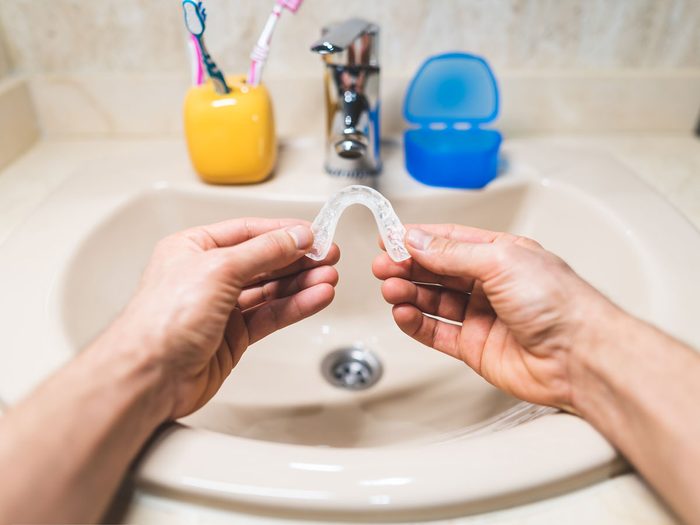
Bite guard
You might feel awkward at first when you hit the hay looking like a hockey player, but a bite splint to wear at night can help prevent the damage of nighttime teeth grinding. When done at the dental office, your dentist (or their staff) takes an impression of your teeth to fit a night guard to your bite properly.
Although dental offices are closed during the coronavirus pandemic, you can purchase a high-quality dental night guard at your local drug store. Keep in mind, it is recommended to get a night guard fabricated at your dental office.
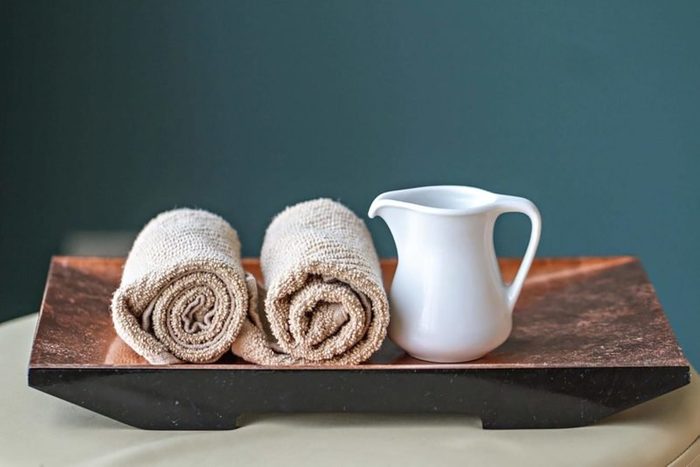
Hot towel/compress
If you find yourself instinctively clenching your jaw, warming it up may just be the answer. This method is best done using a heating pad. While lying down, rest one side of your face on a heating pad for 15 minutes, then repeat on the other side. The heat increases the local blood supply, improves circulation and helps relax the muscles, according to Mazen Natour, a New York City-based prosthodontist. “Heat helps alleviate tension, reducing the potentially destructive grinding,” says Natour.

Magnesium
Tweaking your diet can also help reduce teeth grinding. Magnesium is known to benefit muscle and heart health, and is also integral to the relaxation of muscle tissue and blood vessels. According to Allison Williams, a licensed naturopathic physician at Southwest College of Naturopathic Medicine & Health Services, in Tempe, Arizona, “teeth grinding is due to tight or spasming jaw muscles.” The relaxing effects of magnesium either applied topically (there are magnesium sprays or lotions available), eating magnesium-rich foods, or taking magnesium supplements can prove beneficial. Plus, here’s what you should know before taking a magnesium supplement.

Stress management
Stress is a primary contributor to teeth grinding, so start toning down those elevated stress levels ASAP. You may notice tightening muscles in the neck, jaw, or upper back; these areas tighten up when we’re stressed and can make sleeping less restful. “Stress management practises, in conjunction with other therapies to improve tissue relaxation and reduce muscle spasm, can be great ways to reduce teeth grinding,” notes Dr. Williams. “Journaling, meditation, relaxing baths, yoga, and a quality exercise routine are just a few ideas to consider better stress management practises.”
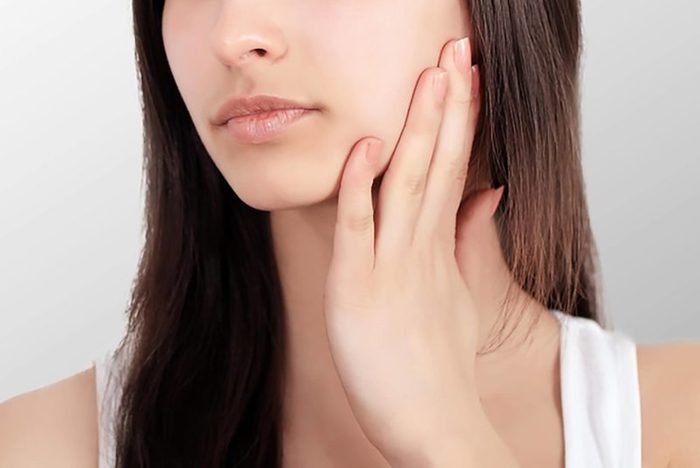
Jaw muscle massage
Your body has quite a few muscles that work to clench and open the jaw—the masseter, temporalis, medial pterygoid, and lateral pterygoid to be exact. When these are overly tight, they can aggravate the mouth and increase teeth grinding, so try to massage them daily in order to help loosen up the musculature.
Dr. Williams advises starting with a jaw stretch:
- Fully open and close your jaw for about 10 repetitions, then open your mouth and move your jaw side to side for an additional 10 repetitions.
- Afterward, take your hands along the side of your jaw starting at the uppermost area from your ears. Use the pads of your fingers and rub in a circular motion where you find tight knots or strictures press, and hold that area for a couple of seconds.
- Move to the lower part of your jawline and do the same, always pressing and holding areas with tight knots or trigger points.
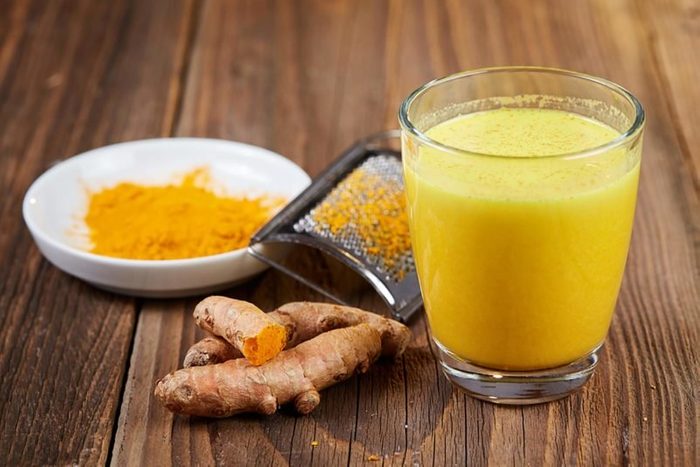
Turmeric milk
You may have heard that drinking a glass of milk before bedtime is good for health, but mixing turmeric with milk is even better. This holy grail of mixtures can help control teeth grinding with its dual-purpose: the amino acid tryptophan in milk helps your nervous system relax and sleep soundly, while turmeric acts as a pain reliever to reduce jaw pain and headaches.
“Improper sleep has shown to increase symptoms of temporomandibular disorders (TMD),” says Peter Drews, DDS, Drew Dental Services, in Lewiston, Maine. “When we do not cycle through our complete sleep cycle, it has shown that we process pain differently.” Things like caffeine, stress, alcohol, and late-night electronic devices affect our ability to have our REM sleep cycle, but natural supplements can help us get back on cycle.”
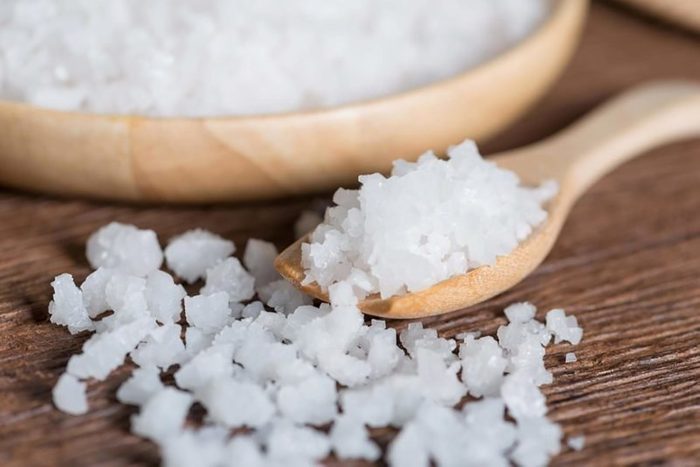
Epsom salt baths
Epsom salts contain detoxing elements that flush out toxins and heavy metals from the body. This compound of magnesium and sulfate is also popular for softening and exfoliating skin, drawing out impurities, and even relieving cold or flu symptoms. This will help increase your magnesium intake (which also assists with teeth grinding). Also, its absorption through the skin will bind with serotonin in the brain, helping you to relax and alleviate stress. “Epsom salt baths are another great option to soothe muscles and reduce tension. Relieving any aches and cramps will cause you to rest better over the course of the night. As an added benefit, you will wake up feeling more refreshed and energized,” informs Rajan Sharma, DDS, board-eligible enthodontist at University Dental Associates, in Chicago.
Next, learn to recognize the signs on secondhand stress.
